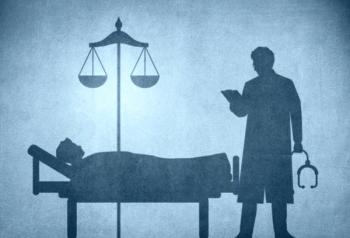
Observing Ethics Awareness Month: An Invitation to Ethics Orienteering
March is Ethics Awareness Month. How does this time apply to psychiatry? What ethical quandaries do you face in your practice?
It is necessary to keep one's compass in one's eyes and not in the hand, for the hands execute, but the eye judges.
-Michelangelo
Ethics Awareness Month “is a time for all individuals and organizations to reflect on the ethics they adhere to and how they can improve upon them.” State governments and courts, businesses and industries, professional associations, educational institutions, and their members dedicate the month to reflecting on strengths and areas for growth in their ethical behavior; learning about ethical theories and codes that inform ethical actions and decisions; and communicating the importance and benefits of greater ethical awareness for individuals and communities.1 We are not of course advocating that ethical awareness be confined to March and yet there is something apposite in the timing of the observation. March is a special month for reflection and renewal: the ancient festivals of the Spring celebrate the return of the light and warmth after the dark and cold of Winter, the Christian season of Lent, and the Moslem holy days of Ramadan, both devoted to fasting, prayer, alms, and spiritual growth among other spiritual commemorations.
Ethical Awareness at Psychiatric Times
Our first official observance of Ethics Awareness Month at Psychiatric Times was in 2023 and we offered a
Ethical Orienteering
For our 2024 commemoration, we are inviting readers to join us in psychiatric ethics orienteering. According to Miriam Webster orienteering is, “a competitive or non-competitive recreational activity in which participants use a map and compass to navigate between checkpoints along an unfamiliar course (as in the woods).”7 Every 2 months, we will provide checkpoints to help readers navigate the ethical territory of Psychiatric Times’ 4 main content areas: schizophrenia/psychosis, mood disorders, addiction, and neuropsychiatry. Multiple complicated, intriguing, and often neglected subjects inhabit these 4 frontiers, as well as the environs of community, geriatric, cultural, and emergency psychiatry. These articles, along with accompanying quizzes, polls, case discussions, and recommended reading will help mental health practitioners to ethically orienteer in their clinics, offices, and hospitals. The Table offers a few examples of ethical issues in these domains—although there are many others— to jumpstart readers' journeys.
Take the first survey
Orienteering Tips
As readers approach ethical orienteering, whether for publication or in their practice, here are a few of my orienteering tips. I picked these up during decades of ethics explorations, many of them not ending up at all where I intended or taking a desultory route to get there, if at all. May they help spare you some of that meandering frustration.
- When first confronting an ethical quandary or even query, do not forget that we all have some trusty tools ready at hand: the American Psychiatric Association Code of Ethics,8 core texts,9 ethical schools of thought, and key articles, are all good equipment to have stored on your bookshelves or laptop. Recently, I was asked to give a major presentation on the ethics of harm reduction, and initially drowning in the specialized literature, I went back to the general theories of what seemed lofty philosophy and was amazed at how they resonated with practitioners in the trenches.10
- Even if you do not have the time or inclination to submit an article for our series, we welcome and will seriously consider questions and cases you send us. If something is bothering you, it is likely also of concern to many of your colleagues. Experienced orienteers can tell you how grateful they are—when doubting their sense of direction—to come upon the cairns a kind fellow traveler has erected to let them know they are on the right track.I remember many years ago receiving my first ethics consultation about covert medication, and not knowing how to begin, I searched the literature and followed the path of strong scholars who had gone before me to find my position.11
- A good way to hone your ethical orienteering skills is to try and see your practice environment be it a hospital, clinic, office, or even home with new eyes. When I tried this exercise with my hospital consultation practice, I realized that I needed to do a better job of obtaining informed consent for medication initiation and changes, and I am a professional ethicist! Once you realize the ethics quality gap, you will be surprised at the energy you have to figure out how to close it.
- We will all face situations where we feel utterly, ethically lost no matter what our education and experience. I have learned the hard way in these circumstances that finding others is the surest way to find yourself. Every one of us needs ethical lights to shine on us when personally and professionally we are wandering in a dark wood. Cultivate trusted colleagues, wise mentors, good friends, and even those with specialized expertise to help get you on the track that is right for you.
Mapping the Territory Together
We invite all our readers and others in the wider world of mental health to contribute to our building of a community compass to map the professional terrain of ethical questions encountered every day in our shared specialty. Through this collective effort to cultivate ethical awareness and develop the skills of ethics orienteering we are aiming to follow the advice philosopher Margaret Walker gave to ethics consultants in a landmark article: “The ethicists special responsibility is to keep open, accessible, and active (and if necessary to create and design with others) those moral-reflective spaces in institutional life where a sound and shared process of deliberation and negotiation can go on.”12
Keeping this space open is critical to our ethical integrity, perhaps more so than any other discipline or branch of health care. Ethics, especially mental health ethics, is not I tell my students about right and wrong, but about what is right and righter. Knowing what is wrong—whether that is framed in terms of our examination of conscience, the standard of care, the law, or policy—is far easier than discerning what among several ethically appropriate options can best balance competing ethical considerations and lead us to the most authentic, empathic, and principled resolution of values conflicts. Developing this level of discernment can only emerge in a moral space that fosters ethical awareness and encourages ethical orienteering.
Dr Geppert is a professor in the Department of Psychiatry and Internal Medicine and director of ethics education at the University of New Mexico School of Medicine in Albuquerque. She is senior ethicist, Veterans Administration National Center for Ethics in Health Care, and an adjunct professor of bioethics at the Alden March Bioethics Institute of Albany Medical College. She serves as the ethics editor for Psychiatric Times.
References
1. National Ethics Awareness Month - March 2024. National Today. Accessed February 27, 2024.
2. Geppert CMA. Psychiatrist time to know thyself. Psychiatric Times. March 1, 2023.
3. Westmoreland PG, Geppert CMA, Komrad MS, et al. "Terminal anorexia": an invalid construct that does not justify medical aid in dying. Psychiatric Times. October 11, 2023.
4. MacIntyre MR, Nair M, Bursztajn HJ.
5. Knoll JL. Psychiatric malpractice grand rounds: the Tarasoff dilemma. Psychiatric Times. September 27, 2019.
6. Blotcky AD, Pies RW, Moffic HS. Contemplating the Goldwater Rule. Psychiatric Times. February 3, 2022.
7. Merriam-Webster. Orienteering Merriam-Webstercom Dictionary.
8. The Principles of Medical Ethics with Annotations Especially Applicable to Psychiatry. American Psychiatric Association; 2013.
9. Roberts LW. A Clinical Guide to Psychiatric Ethics. American Psychiatric Publishing; 2016.
10. Christie T, Groarke L, Sweet W.
11. Latha KS.
12. Walker MU.
Newsletter
Receive trusted psychiatric news, expert analysis, and clinical insights — subscribe today to support your practice and your patients.







